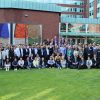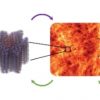Research in the TuttleLab is focused on the concept of reducing molecular search spaces. The reduction of molecular search spaces involves the use of computational methodology to inform, focus and drive the direction of molecular research. The group works in close collaboration with experimental colleagues to ensure the results from our design work are able to be directly implemented in a practical laboratory. The process of reducing molecular search spaces involves three phases: (1) rationalising and understanding existing systems; (2) isolating the governing molecular processes; and (3) predicting new systems with enhanced/desirable properties and reactivities. A variety of different methods are used in pursuit of this goal, including ab initio, DFT, semi-empirical, MM, coarse grain and hybrid QM/MM methodologies.
News From the Lab

Tuttlelab at the Peptide Self-Assembly 2023 Conference!
Hosted by the University of Machester between the 25th and 27th of July, several members of the Tuttlelab attended the Peptide Self-Assembly conference (PSA2023). With a focus on creating collaboration, the conference was attended by a host of researchers from all over the world. Tell gave a well received presentation which detailed recent advances in […]
Host of Publications Hit the Printing Press
The Tuttle lab has seen a successful few months with papers from newly minted Dr. van Teijlingen and final year PhD studentd Hamish and Robert having been published! Hamish and Ross have also seperately published textbook chapters. All details of the most recent publications can be seen in the publications page of the Tuttle Lab […]

Alex publishes in Angewandte Chemie!
Congratulations to Alex whose paper titled “Integrating Computation, Experiment, and Machine Learning in the Design of Peptide-Based Supramolecular Materials and Systems” has been accepted into Angewandte Chemie. In collaboration with colleagues from the City University New York, the paper gives an insightful review into computationally driven peptide self assembly and explores the interface between computational […]

Alex’s Successful Defence!
Alex successfully defended his thesis on a cold Glasgow day in January. His thesis titled: “Extending Peptide Search Space and Self-Assembly Methods” was examined by Dr Antonia Mey, University of Edinburgh, and Dr David Palmer, University of Strathclyde. Alex used a mixture of molecular dynamics simulations and latterly, machine learning methods to explore the peptide […]









